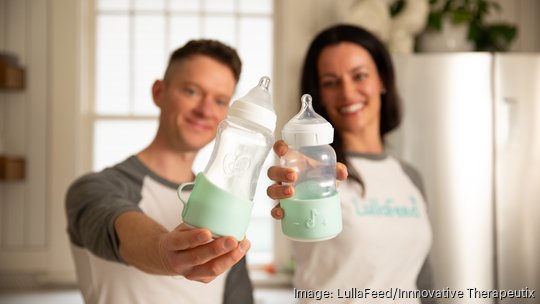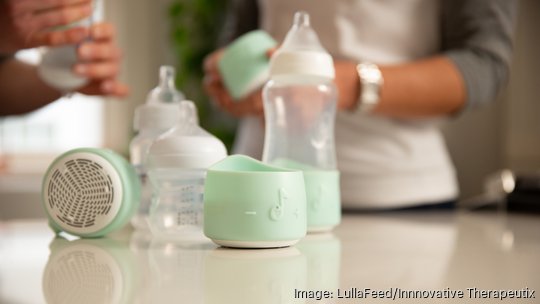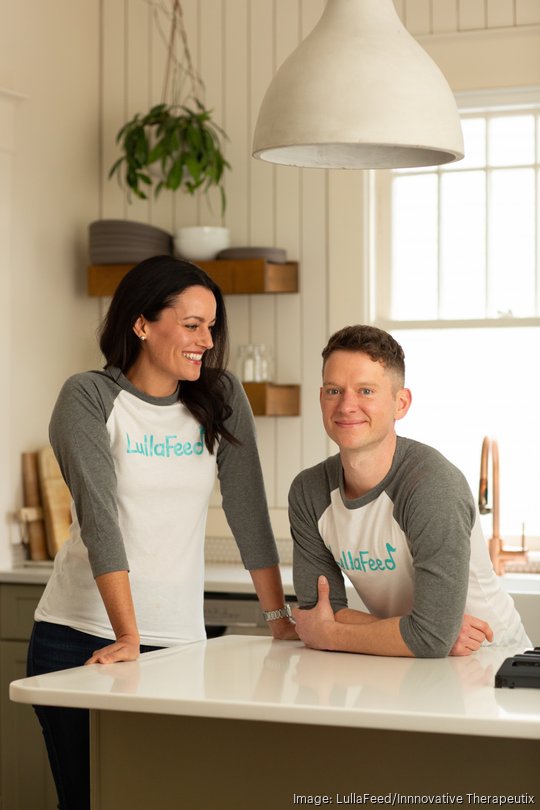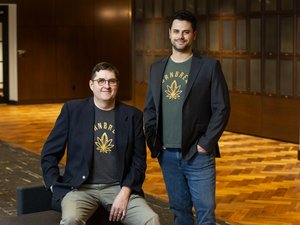
A waitlist is just a waitlist — except when it’s more.
For a startup, it can unlock insights that were not yet focal points of the founders’ initial efforts before a product launch.
That has been the case for Louisville-based Innovative Therapeutix, as it prepares to send its LullaFeed baby bottle device within the next 10 months or so.
As of a recent date, the company had 354 potential customers on its waitlist, which began in October 2023. LullaFeed/Innovative Therapeutix was recently named as a finalist for our 2024 KY Inno on Fire Awards.
When CEO Michael Detmer and CCO Rebekah Gossom first developed the device, they did so from a clinical standpoint to help address issues that they say were prevalent while working in the neonatal intensive care unit at Norton Women’s and Children’s Hospital (with Detmer serving as music therapist and Gossom serving as a speech-language therapist). Approximately 60% of U.S. infants struggle with feeding each year, according to their research.
They thought most of the interested customers would be moms of infants. They did not put much consideration, at first, in to other interested parties, such as aunts, uncles, grandparents and daycare workers and healthcare professionals.

Three-fourths of the waitlist are composed of friends and families of infants, Detmer said.
“As we were [receiving feedback] … the feedback we got was, ‘Oh, if grandma couldn’t see the baby or meet the baby she could send her [a] song, and then the baby could get introduced to grandma’s voice, or mom could feel less guilty dropping her kid off at daycare, which was, a big ‘a-ha moment’ for us from a market perspective,” Detmer told me.
“We were thinking pretty linear. Like, this is for mom, while mom’s feeding her baby, probably to address a problem, and then we quickly learned that people are interested in the music benefits and the developmental benefits of this — even outside of addressing a known feeding issue.”
I recently spoke with Detmer and Gossom a few weeks after they closed a second seed round in which they raised more than $548,000 on Wefunder from an initial goal of $500,000.
Detmer said that they had 92 new investors through Wefunder, which required a minimum investment of $100. Furthermore, the company raised approximately $100,000 alone at a kickoff party in late February held at West Sixth NuLu.
He added that a majority of the recent funding will be going toward making product revisions and app updates. The rest will go toward initial inventory, marketing and sales efforts and the initial tooling for the product.
How LullaFeed works
“We’re redesigning this right now to be a little bit more ergonomic and flexible to fit other sizes and shapes of bottles,” Detmer told me, while holding up a prototype that has been in circulation since December 2023 for initial testing.
As we first chronicled in 2021, the device works by latching onto the bottom of a bottle. Using patented (and patent-pending) technology, sensors on the device detect when the child is actively feeding, which then causes music (lullabies) to play — or a recording of a familiar voice.

“The music is the support or the reinforcement or encouragement to provide to the baby to continue feeding and feeding at the pace or the tempo that is rhythmic,” said Detmer, who added the default music is played at 60 beats per minute, which is the normal suck rate for infants.
Nearly 50 families have tested out the prototype, Detmer said.
What's next for Innovative Therapeutix?
The plan is to first have the products available on the company’s website as well as on Amazon — and later on baby registry sites, and possibly big box store e-commerce platforms as well.
The suggested retail price has not been set, but Detmer said it would be higher than $50, but lower than $100. If all goes as planned, the company will bring the LullaFeed to market in May, but may do a test launch earlier in the spring to small customer segments.
As of a recent date, the company has raised a total of $1.26 million, both dilutive and non-dilutive funding. Before the Wefunder raise, some of the company’s more notable investors were Render Capital (via being a winner of the Render Competition in 2021), Kentucky Science & Technology Corporation (KSTC)/Keyhorse Capital, CATO Neonatal Innovations, Inc., and Gill Holland.
Gossom said that the company came together, more or less, over a lunch between the two founders one day.
Gossom told Detmer about an idea she had that involved attaching different items (like ribbons or toys) to encourage the baby to interact with the bottle.
“We just started bouncing things off each other with devices that we already use,” Gossom said. “And it just kind of it snowballed into using the mother’s voice with singing, and with interacting with the bottle. And it just kind of went from there.”










